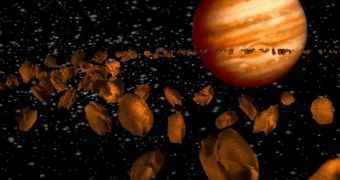At a recent conference, entitled “Near-Earth Objects: Risks, Responses and Opportunities-Legal Aspects,” experts around the world accurately pinpointed some of the most important factors that would, in the event of an imminent asteroid collision, make any efforts of stopping it fruitless. The experts, including astronomers and lawyers, said that there was at the moment no groundwork set for a potential collaboration between states in the event of an incoming asteroid or comet, and that political and economic rivalries would most definitely make such a cooperative effort useless.
“The word 'unorganized' is spot on here. There is no such thing as even a platform for some level of coordination regarding possible responses – and, to be honest, some quarters very much would like it to remain that way,” space law expert Frans von der Dunk, based at the University of Nebraska-Lincoln (UNL), which hosted the recent talks, said. He also mentioned that the legal fallouts of a potential asteroid threat would be devastating, if the situation at that point was not fixed soon.
He brought up the subject of the US firing at one of its own satellites a couple of years ago, knocking it off-orbit. China performed a similar test as well, when it used a ballistic missile to destroy one of its own weather satellites. The reactions at the international level, following the two attacks in Earth's orbit, will be nothing compared with the outcry that would be generated if some countries decided to launch nuclear weapons to destroy an incoming asteroid.
“The international political reactions to the U.S. shooting down of its own satellites a year ago to prevent presumably dangerous and toxic fuel from reaching Earth only foreshadows what would happen if the U.S. would detonate nukes claiming to destroy an incoming asteroid,” von der Dunk told SPACE in an interview. The expert will be present at the Planetary Defense Conference, between April 27th and April 30th, which takes place in Spain. There, he will present the conclusion of the UNL conference to the International Academy of Astronautics (IAA) and the European Space Agency (ESA).
In the end, experts believe, there are not a good many ways in which an asteroid could be deflected from hitting the Earth. Depending on how early it's discovered, it could be nudged off-course by shifting its center of gravity, or by exploding a number of charges on one of its sides. Alternatively, it could be blown up altogether, depending on its dimensions.
But the force required to explode a very fast asteroid into pieces unable to harm our planet can only come from nuclear or hydrogen bombs, which means that the ensuing arguments would be massive. Under such circumstances, humankind stands a good chance of perishing before countries get past their ego and actually do something to save themselves.

 14 DAY TRIAL //
14 DAY TRIAL //